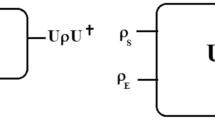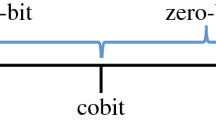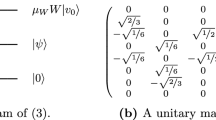Abstract
In this work, we prove that quantum error correcting codes do not fix isotropic errors (Theorem 5), even assuming that their correction circuits do not introduce new errors. We say that a quantum code does not fix a quantum computing error if its application does not reduce the variance of the error. We also prove for isotropic errors that, if the correction circuit of a quantum code detects an error, the corrected logical m-qubit has uniform distribution (Theorem 3) and as a result, it already loses all the computing information.


Similar content being viewed by others
References
Gaitan, F.: Quantum Error Correction and Fault Tolerant Quantum Computing. CRC Press, Boca Raton (2008)
Calderbank, A.R., Shor, P.W.: Good quantum error-correcting codes exist. Phys. Rev. A 54, 1098–1105 (1996)
Steane, A.M.: Multiple particle inference and quantum error correction. Proc. R. Soc. A 452, 2551 (1996)
Gottesman, D.: Stabilizer Codes and Quantum Error Correction. PhD thesis, California Institute of Technology (1997)
Calderbank, A.R., Rains, E.M., Shor, P.W., Sloane, N.J.A.: Fellow, quantum error correction via codes over GF(4). IEEE Trans. Inf. Theory 44(4), 1369–1387 (1998)
Shor, P.W.: Fault-tolerant quantum computation. Symposium on the Foundations of Computer Science, Los Alamitos, CA (1996)
Preskill, J.: Reliable quantum computers. Proc. R. Soc. Lond. A 454, 385–410 (1998)
Steane, A.M.: Active stabilization, quantum computation and quantum state synthesis. Phys. Rev. Lett. 78, 2252 (1997)
Gottesman, D.: Theory of fault-tolerant quantum computation. Phys. Rev. A 57, 127–137 (1998)
Gilbert, G., Hamrick, M., Weinstein, Y.S.: End-to-end fault tolerance. Quantum Inf. Process. 7, 263 (2008). https://doi.org/10.1007/s11128-008-0087-4
Nakahara, M.: Frank Gaitan: quantum error correction and fault tolerant quantum computing. Quantum Inf. Process. 11, 629–631 (2012). https://doi.org/10.1007/s11128-011-0287-1
Nielsen, M.A., Chuang, I.L.: Quantum Computation and Quantum Information. Cambridge University Press, Cambridge (2010)
Lacalle, J., Pozo Coronado, L.M.: Variance of the sum of independent quantum computing errors. Quantum Inf. Comput. 19(15–16), 1294–1312 (2019)
Scott, A.J.: Probabilities of failure for quantum error correction. Quantum Inf. Process. 4, 399–431 (2005). https://doi.org/10.1007/s11128-005-0002-1
Preskill, J.: Sufficient condition on noise correlations for scalable quantum computing. Quantum Inf. Comput. 13(3–4), 181–194 (2013)
Gottesman, D.: Fault-tolerant quantum computation with constant overhead. Quantum Inf. Comput. 14(15), 1338–1372 (2014)
Cross, A.W., Divincenzo, D.P., Terhal, B.M.: A comparative code study for quantum fault tolerance. Quantum Inf. Comput. 9(7), 541–572 (2009)
Hill, C.D., Fowler, A.G., Wang, D.S., Hollenberg, L.C.L.: Fault-tolerant quantum error correction code conversion. Quantum Inf. Comput. 13(5), 439–451 (2013)
Duclos-Cianci, G., Poulin, D.: Fault-tolerant renormalization group decoder for abelian topological codes. Quantum Inf. Comput. 14(9), 721–740 (2014)
Hocker, D., Zheng, Y., Kosut, R., Brun, T., Rabitz, H.: Survey of control performance in quantum information processing. Quantum Inf. Process. 15, 4361–4390 (2016). https://doi.org/10.1007/s11128-016-1406-9
Hocker, D., Kosut, R., Rabitz, H.: PEET: a Matlab tool for estimating physical gate errors in quantum information processing systems. Quantum Inf. Process. 15, 3489–3518 (2016). https://doi.org/10.1007/s11128-016-1337-5
Aliferis, P., Gottesman, D., Preskill, J.: Quantum accuracy threshold for concatenated distance-3 codes. Quantum Inf. Comput. 6, 97–165 (2006)
Wang, D.S., Fowler, A.G., Stephens, A.M., Hollenberg, L.C.L.: Threshold error rates for the toric and planar codes. Quantum Inf. Comput. 10(5), 456–469 (2010)
Aggarwal, V., Calderbank, A.R., Gilbert, G., Weinstein, Y.S.: Volume thresholds for quantum fault tolerance. Quantum Inf. Process. 9, 541–549 (2010). https://doi.org/10.1007/s11128-010-0181-2
Criger, B., Terhal, B.: Noise thresholds for the [4,2,2]-concatenated toric code. Quantum Inf. Comput. 16(15), 1261–1281 (2016)
Ozen, M., Guzeltepe, M.: Quantum codes from codes over Gaussian integers with respect to the Mannheim metric. Quantum Inf. Comput. 12(9), 813–819 (2012)
Li, R., Zou, F., Liu, Y., Xu, Z.: Hermitian dual containing BCH codes and construction of new quantum codes. Quantum Inf. Comput. 13(1), 21–35 (2013)
Chen, J., Chen, Y., Huang, Y., Feng, C.: New optimal asymmetric quantum codes and quantum convolutional codes derived from constacyclic codes. Quantum Inf. Process. 18, 40 (2019). https://doi.org/10.1007/s11128-018-2156-7
La Guardia, G.G.: Asymmetric quantum Reed–Solomon and generalized Reed–Solomon codes. Quantum Inf. Process. 11, 591–604 (2012). https://doi.org/10.1007/s11128-011-0269-3
Boulant, N., Pravia, M.A., Fortunato, E.M., Havel, T.F., Cory, D.G.: Experimental concatenation of quantum error correction with decoupling. Quantum Inf. Process. 1, 135–144 (2002). https://doi.org/10.1023/A:1019623208633
Evans, Z.W.E., Stephens, A.M.: Optimal correction of concatenated fault-tolerant quantum codes. Quantum Inf. Process. 11, 1511–1521 (2012). https://doi.org/10.1007/s11128-011-0312-4
Dias de Albuquerque, C., Palazzo Jr., R., Brandani da Sil, E.: Families of codes of topological quantum codes from tessellations tessellations 4i+2,2i+1, 4i,4i, 8i-4,4 and 12i-6,3. Quantum Inf. Comput. 14(15), 1424–1440 (2014)
Naghipour, A., Jafarizadeh, M.A., Shahmorad, S.: Topological quantum codes from self-complementary self-dual graphs. Quantum Inf. Process. 14, 4057–4066 (2015). https://doi.org/10.1007/s11128-015-1115-9
Greenbaum, D., Dutton, Z.: Modeling coherent errors in quantum error correction. Quantum Sci. Technol. 3(1), 015007 (2018)
Bravyi, S., Englbrecht, M., Konig, R., Peard N.: Correcting coherent errors with surface codes. npj Quantum Inf. 4, art. 55 (2018)
Piltz, C., Sriarunothai, T., Varón, A.F., Wunderlich, C.: A trapped-ion-based quantum byte with \(10^{-5}\) next-neighbour cross-talk. Nat. Commun. 5, art. 4679 (2014)
Buterakos, D., Throckmorton, R.E., Das Sarma, S.: Crosstalk error correction through dynamical decoupling of single-qubit gates in capacitively coupled singlet-triplet semiconductor spin qubits. Phys. Rev. B 97(4), 045431 (2018)
Zurek, W.H.: Decoherence and the transition from quantum to classical—revisited. In: Duplantier, B., Raimond, J.M., Rivasseau, V. (eds.) Quantum Decoherence Progress in Mathematical Physics, vol. 48. Birkhäuser, Basel (2006)
Bennet, C.H., DiVincenzo, D.P., Smolin, J.A., Wootters, W.K.: Mixed state entanglement and quantum error correction. Los Alamos Physics Preprint Archive. http://xxx.lanl.gov/abs/quant-ph/9909058 (1999)
Laflamme, R., Miquel, C., Paz, J.-P., Zurek, W.H.: Perfect quantum error correction codes. Phys. Rev. Lett. 77, 198 (1996). Los Alamos Physics Preprint Archive. http://xxx.lanl.gov/abs/quant-ph/9602019
Author information
Authors and Affiliations
Corresponding author
Additional information
Publisher's Note
Springer Nature remains neutral with regard to jurisdictional claims in published maps and institutional affiliations.
Appendix
Appendix
The values of the integrals that have been used throughout the article are included in this appendix:
Starting from the first integral, the surface of a unit sphere of arbitrary even (2d) or odd (\(2d-1\)) dimension can be calculated:
Rights and permissions
About this article
Cite this article
Lacalle, J., Pozo-Coronado, L.M. & Fonseca de Oliveira, A.L. Quantum codes do not fix isotropic errors. Quantum Inf Process 20, 37 (2021). https://doi.org/10.1007/s11128-020-02980-3
Received:
Accepted:
Published:
DOI: https://doi.org/10.1007/s11128-020-02980-3




